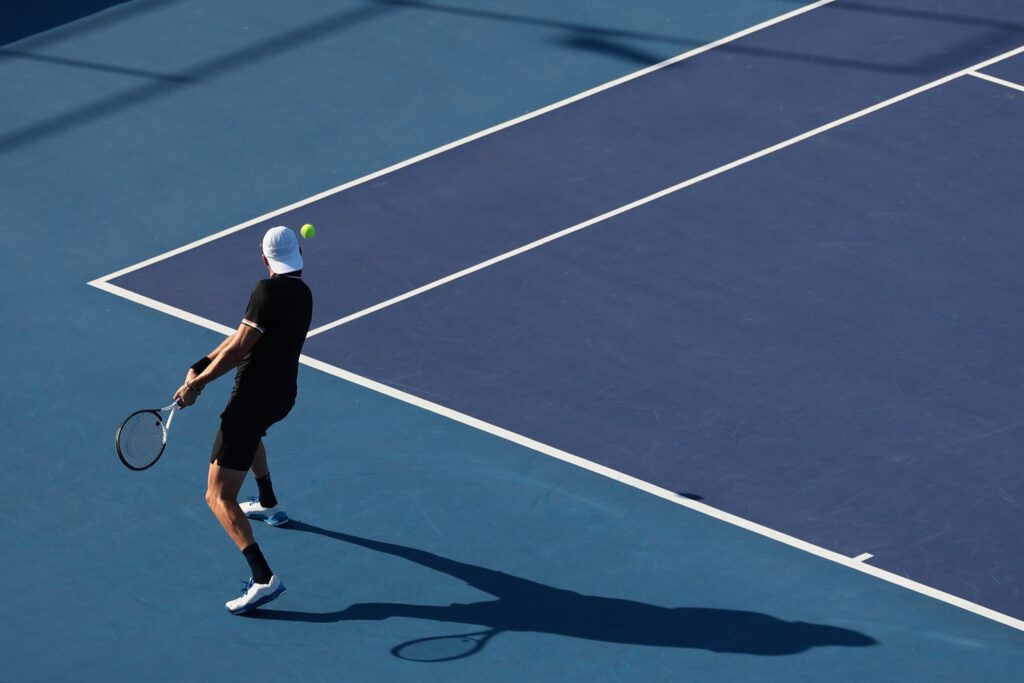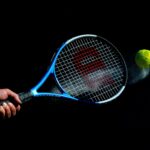Introduction: More Than Just Match Day
People often think tournament weeks are just about the matches — show up, warm up, play, go home. But there’s so much more that goes on behind the scenes. Nutrition, recovery, mindset, schedule tweaks… it’s a delicate juggling act.
Tournament week is a test of not just your game — but your routine.
So I thought I’d give you a proper look into what a typical tournament day looks like for me. It’s part discipline, part adaptation, part nerves — and always, always a bit of last-minute banana eating.
Let’s walk through it.
07:30 – Wake Up (Not by Alarm, but by Nerves)
Tournament mornings have a different energy. I usually wake up earlier than planned — not from restlessness, but from a kind of quiet anticipation.
I keep things slow:
- Check the weather and court schedule
- Quick journal entry: goals for the day
- Light stretching while listening to music
- A cold splash of water on the face — gets the brain going!
🎧 Morning playlist: calm acoustic tracks — nothing too hype just yet.
08:00 – Breakfast That Doesn’t Rock the Boat
I keep it simple. My body doesn’t like surprises on match days.
Go-to meal:
- Porridge with banana + almond butter
- Black coffee or mint tea
- Electrolyte water (start hydrating early!)
This combo keeps me fuelled without weighing me down.
I aim to finish breakfast 2.5–3 hours before my match start time.
09:00 – Light Movement & Visualisation
Before I head to the venue, I do a light activation routine:
- Resistance band work (glutes, shoulders, ankles)
- Mobility stretches
- 10 mins of shadow swings and split steps
Then I sit down with my notebook and mentally rehearse:
- My service routine
- How I want to play the first two games
- What I’ll do if I go down a break
The idea is to walk onto court feeling like I’ve already played the match once in my mind.
10:30 – Arrive at Venue + Warm-Up Hit
I get there early. Always.
Nothing throws off a match like feeling rushed, so I:
- Check in
- Do a full dynamic warm-up (jog, skips, agility drills)
- Hit for 20–30 minutes with a partner or coach — rhythm, not intensity
- Do serve reps only if they feel good — no “fixing” last minute
I aim to leave the practice court feeling sharp, not drained.
12:00 – Match Time: Lock In
Final prep:
- One more banana
- Deep breath
- A quick pep-talk: “You’ve done the work. Now go enjoy the fight.”
On court, I focus on:
- My routines between points
- Body language (even when nervous)
- Playing smart, not safe
I don’t expect perfection — just effort and presence.
Win or lose, I aim to walk off knowing I gave everything.

13:45 – Post-Match Cool Down & Reflection
Regardless of the result, recovery starts immediately:
- Slow jog + stretching
- Electrolyte drink
- Light snack (wrap or protein bar)
- Quick debrief with coach or journal entry
I ask myself:
- What worked?
- What could I have done better?
- What’s one thing I’ll focus on next match?
Even 5 minutes of reflection helps lock in lessons.
15:00 – Down Time (But Not Couch Time)
This part depends on the draw. If I’ve got another match later, I stay near the venue and rest actively.
If I’m done for the day:
- Short walk or light yoga
- Maybe a nap (no more than 30 minutes)
- Phone off for a bit — mental reset
Sometimes I’ll watch a fun match replay or do breathing exercises. No overanalysis. Just reset and recharge.
18:00 – Dinner + Stretch + Switch Off
I aim for a balanced dinner — lots of greens, carbs and lean protein. Nothing heavy or greasy.
Then:
- Foam roll (especially quads, calves, back)
- Stretch or do a 15-minute recovery yoga session
- Set gear out for the next day
- Early night (lights off by 22:30 if possible)
💤 Rest is the secret weapon most people overlook.
Final Thoughts: Tournament Days Aren’t Glamorous — But They’re Powerful
People see the match score. But they don’t see the hours of prep, the small decisions, or the inner conversations happening before every serve.
Tournament days are about more than tennis — they’re about managing your time, your body, and your mind.
And that’s what I love about them.
Whether I walk off with a win or a lesson, I know that every tournament week makes me a little tougher, a little wiser, and a little more prepared for the next one.






